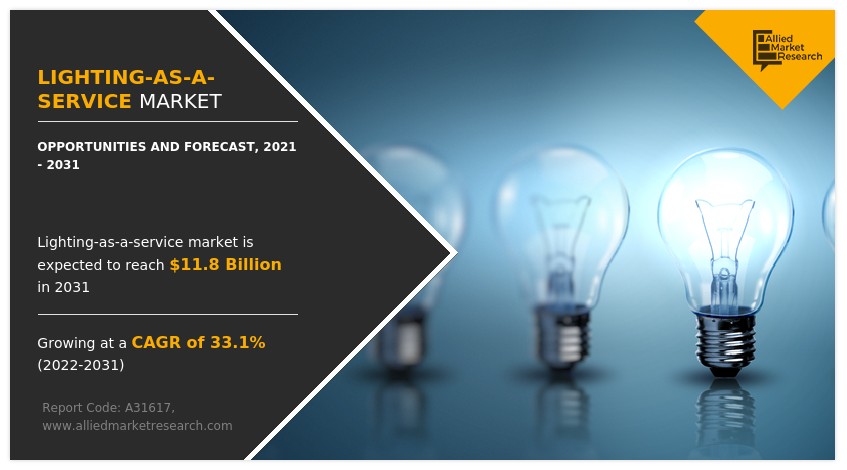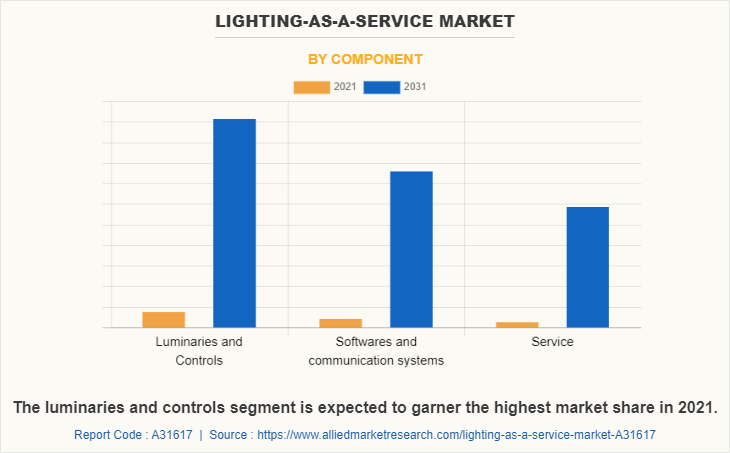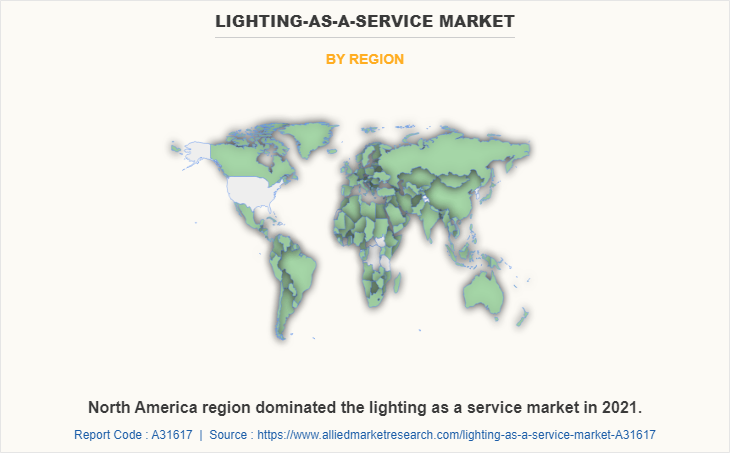Lighting-as-a-Service Market Insights, 2031
The global lighting-as-a-service market was valued at $694.7 million in 2021, and is projected to reach $11.8 billion by 2031, growing at a CAGR of 33.1% from 2022 to 2031.
Increase in adoption of lighting as a service products and cost & energy saving properties of lighting as a service are factors driving the growth of the lighting as a service market. Moreover, the market is majorly driven by the escalating demand for energy-efficient lighting systems across the globe. This can be attributed to the paradigm shift of the masses towards sustainable lighting solutions from conventional lighting.

Moreover, continual product innovations and launch of new products are providing an impetus to the LaaS market growth. Also, rapid utilization of light-emitting diode (LED) as an energy-efficient lighting technology is creating a positive outlook for the market. Therefore, growing adoption of lighting-as-a-service products is driving the growth of the market. However, lack of familiarity with new technology and lighting control products limits the growth of the market. On the contrary, few initiatives for energy efficiency and energy conservation taken by government through Bureau of Energy Efficiency (BEE) initiated the standards & labeling programme for equipment and appliances to provide the consumer with an informed choice about the energy saving is expected to provide lucrative growth opportunities to the market in the upcoming years.
Lighting as a service (LaaS), also known as light-as-a-service, is a service-based business model, in which light service is charged on a subscription basis rather than via a one-time payment. It is managed by third parties more precisely by specialized service providers and may include, light design, financing, installation, maintenance, and other services. Furthermore, the LaaS model has become more common in commercial and citywide installations of LED lights, specifically in retrofitting buildings and outdoor facilities, with the prior aim of reducing installation costs. Moreover, light vendors have used the LaaS strategy in selling value-added services, such as internet-connected lighting and energy management. The lighting-as-a-service market is segmented into Component, Installation and End User.
Segment Review
The lighting as a service market is segmented on the basis of component, installation, end user, and region. On the basis of component, the market is segmented into luminaries and controls, softwares and communication systems, and service. On the basis of installation, the market is segmented into outdoor and indoor. By end user, the market is segmented into commercial, municipal, and industrial. On the basis of region, the market is segmented into North America, Europe, Asia-Pacific, and LAMEA.
By component, the luminaries and controls segment dominated the lighting-as-a-service market size in 2021, and is expected to maintain its dominance in the coming years owing to adoption of lighting as a service by various governments and industrial sectors for energy efficient lighting system. However, the services segment is expected to witness highest growth rate during the forecast period, owing to rise in adoption of LaaS services among end users, such as municipal and manufacturing as they ensure effective functioning of solutions and platforms throughout the lighting process.

Region-wise, North America dominated the lighting-as-a-service market share in 2021, and is expected to retain its position during the forecast period. This is attributed to a number of factors, including adoption of lighting as a service among various end users such as government and commercial sectors in the region. In addition, presence of growing number of lighting as a service vendors across the U.S. and Canada is expected to provide lucrative opportunities for the market. However, Asia-Pacific is expected to witness significant growth during the forecast period, owing to wide presence of small-and medium-scale organizations, which are turning toward lighting as a service solution to efficiently manage their lighting system, particularly in developing countries such as China, India, and South Korea.

Top Impacting Factors
Cost and energy saving properties of lighting-as-a-service
The savings of energy and cost offered by the system drive the utilization of the lighting as a service technology across various applications in commercial sector. This factor is estimated to propel the growth of the global lighting as a service (LaaS) market. Moreover, adoption of sustainable development by major countries has increased growing need for energy saving across the globe, thus, creating scope for the market.
This highly advanced lighting technology offers several benefits, such as users will be relieved from the burden of burnout, minor upgrades are allowed to be done without any extra cost, and others. Therefore, growing adoption of lighting as a service is considered as the major driving factors for the growth of the lighting as a service market.
Increasing adoption of lighting-as-a-service products
LED lighting is taking place of traditional incumbent technologies. Adoption of modern solutions in lighting system to meet customer demand is rapidly changing the lighting-as-a-service industry. Furthermore, the lighting service markets provide services, such as maintenance and management, installation, financials, technical, designing, and other services. Moreover, companies even offer a combination of such services for providing better service, which enables better customer retention for longer period of time.
In addition, using 50+% less energy consumption LED lights to produce brighter, clearer light without the flicker that often irritates the optic nerve leading to employee complaints about headaches and fatigue has increased the need of lighting-as-a-service industry. In addition, LED lights contain no hazardous materials, do not flicker or strobe, and are completely recyclable. Therefore, increased adoption of lighting-as-a-service products is considered as the driving factor for the lighting-as-a-service industry growth.
COVID-19 Impact Analysis
The novel coronavirus majorly affected the livelihood of people, put the economy in shambles, and the world has been severely affected by the novel coronavirus. The supply chain was one of the first industries to witness the repercussions of the pandemic. With travel bans in place and logistics suspensions, the import of lighting supplies became challenging. Furthermore, the lighting production outlets also came to a halt as their workforce cannot resume their duties due to quarantine. However, COVID-19 has continuously affected allied sectors that are associated with the lighting as service market. In addition, the implementation of work-from-home policies limited the market growth. Thus, COVID-19 had a negative impact on the lighting as a service market.
Key Benefits for Stakeholders
- This report provides a quantitative analysis of the market segments, current trends, estimations, and dynamics of the mobile security market analysis from 2021 to 2031 to identify the prevailing lighting-as-a-service market forecast.
- The market research is offered along with information related to key drivers, restraints, and opportunities.
- Porter's five forces analysis highlights the potency of buyers and suppliers to enable stakeholders make profit-oriented business decisions and strengthen their supplier-buyer network.
- In-depth analysis of the LaaS market segmentation assists to determine the prevailing market opportunities.
- Major countries in each region are mapped according to their revenue contribution to the global market.
- Market player positioning facilitates benchmarking and provides a clear understanding of the present position of the market players.
- The report includes the lighting-as-a-service market analysis of the regional as well as lighting-as-a-service market trends, key players, market segments, application areas, and market growth strategies.
Lighting-as-a-Service Market Report Highlights
| Aspects | Details |
| Market Size By 2031 | USD 11.8 billion |
| Growth Rate | CAGR of 33.1% |
| Forecast period | 2021 - 2031 |
| Report Pages | 220 |
| By Component |
|
| By Installation |
|
| By End User |
|
| By Region |
|
| Key Market Players | Honeywell International Inc., Eaton, Every Watt Matters, Stouch Lighting., Seiko Epson Corporation, Koninklijke Philips N.V., Lutron Electronics Co., Inc, Digital Lumens, Incorporated., IGOR INC. , OSRAM GmbH. |
Analyst Review
Lighting as a Service (LaaS) has emerged as a solution to commercial lighting needs. This model allows businesses to upgrade their lighting with zero-capital investment, as well as provides numerous financial, environmental, and business benefits. LaaS makes it easy for businesses to afford other improvements to their business, while still taking advantage of a lighting upgrade. Furthermore, the energy savings generated from a lighting as a service (LaaS) commercial LED lighting upgrade, can be put back to better use. With an LED lighting upgrade, user will have the ability to invest the cash they save from energy usage and maintenance costs into operational or growth initiatives for their business. Moreover, the commercial LED lighting reduces a business's carbon footprint instantly due to its gentler manufacturing process. LED lighting consumes a fraction of energy as compared to older lighting technology, such as HID (High-Intensity Discharge) or metal halide, thus significantly reducing CO2 emissions from power plants.
SIB Lighting, a Charleston-based commercial LED lighting solutions company that works primarily in the Southeastern U.S. market, has been rebranded to U.S. Lighting Systems after entering into a licensing agreement. US Lighting Systems is a National LED company that helps smaller, regional lighting companies with infrastructure, project management, and marketing. Furthermore, technological advancements in LED lighting over the last several years have resulted in compelling economics as LaaS allow for zero upfront cost solutions. The company plans to expand by acquiring other firms and entering into licensing agreements in other parts of the country. In addition, it helps companies increase their productivity and save money through managing turnkey conversions of lighting systems. With a focus on mid-market companies, US Lighting Systems offers solutions throughout the entire country and has helped clients save millions of dollars. Some of the key players profiled in the report include, Eaton, Digital Lumens, Incorporated, Every Watt Matters, Honeywell International Inc., IGOR Inc., Koninklijke Philips N.V., Lutron Electronics Co., Inc., OSRAM GmbH, Seiko Epson Corporation, and Stouch Lighting. These players have adopted various strategies to increase their market penetration and strengthen their position in the industry.
Global Lighting as a Service Market is expected to reach $11,788.79 million by 2031.
Increasing adoption of lighting as a service product and cost and energy saving properties of lighting as a service are factors that propel the growth of the lighting as a service market.
The key growth strategies for Lighting-as-a-Service include product portfolio expansion, acquisition, partnership, merger, and collaboration.
Eaton, Digital Lumens, Incorporated, Every Watt Matters, Honeywell International Inc., IGOR Inc., Koninklijke Philips N.V., Lutron Electronics Co., Inc., OSRAM GmbH, Seiko Epson Corporation, and Stouch Lighting.
The North America is the largest market for the lighting as service market.
Loading Table Of Content...


